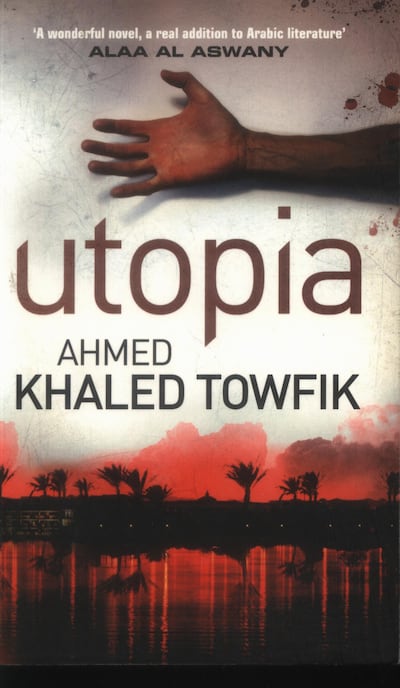His dystopian vision of the future is still five years away, but science fiction writer Ahmed Khaled Towfik leaves a legacy that will last long beyond 2023, the year in which his famous work, Utopia, is set.
The first author of his kind in the Arab world, the 55-year-old thriller, horror and sci-fi writer, who died on Monday, leaves an astonishing body of work and generations of fans who have been inspired by his writing – some even going on to become authors themselves.
Towfik only began publishing his novellas at the age of 32, but was prolific with more than 500 books to his name, at one point churning out 22 books a year while working full time as a professor of tropical diseases at the university in Tanta, Egypt, the city where he was born.
Tributes have been pouring in from those influenced by his work, from readers whose teenage years were shaped by his writing to Egyptian Culture Minister Inas Abdel-Dayem, who described how he “enriched culture in Egypt and the Arab world” with his “enjoyable and captivating style”.
The son of a cotton trader and a university secretary, Towfik began writing adventure stories at the age of 10, but it took him decades to share his work with the world.
Born in June 1962, he spent his childhood absorbing great British, American and Russian novels and plays by the likes of Somerset Maugham – to whom he was often compared – Mark Twain, Anton Chekhov and Leo Tolstoy, thanks to his father’s extensive library, always keeping a dictionary to hand in case he stumbled over unfamiliar words.
Towfik once told The National: "My father was a very literate man and most of the family income was spent on books."
He began writing thrillers, he said, because “my English was not good enough to read horror literature, so I started writing it myself”.
He was 32, however, before he published any of his work, sending five manuscripts to a publisher.
“I had been writing secretly for myself the whole time, and reached saturation point,” he said at the Emirates Airline Festival of Literature in Dubai last year. “A cow must be milked or it will run dry.”
To an audience reading in Arabic, his work was a revelation. He quickly developed a cult following with his novellas and series such as Fantasia, in which he brought classical literary figures from the likes of Arthur Conan Doyle and Dostoevsky to life, as well as the thrillers in his Ma Waraa Al Tabiaa (metaphysics) series, featuring the semi-autobiographical doctor Refaat Ismael.
Although he had given up practising medicine to teach full-time, much of his medical knowledge played a part in his stories, particularly in Metaphysics.
Towfik had a fan base among younger readers, and inspired a generation of younger writers such as Vertigo author Ahmed Mourad.
But it was politics that preoccupied him in his later years, particularly after the Egyptian uprising in 2011.
The Tahrir Square protests were still some way off, however, when Towfik wrote Utopia in 2007. It has since been translated into five languages – English, French, Finnish, German and Italian – from the original Arabic.
The book is set in an exclusive gated compound in Egypt, where over-privileged, rich teenagers hunt impoverished “Others” who live beyond the gates for sport, bringing back limbs as trophies.
Treated as a cult hero in the Middle East, Towfik's reach even extended to western academics. Utopia was on the syllabus of universities including Dartmouth College in the US and the American University of Cairo but, said Towfik, "I did not feel [Utopia] made much impact beyond academic circles. The work did not receive much publicity in the West. It started successfully with a UK tour and many good reviews in newspapers, then it stopped. Only scholars were interested in it."
However, it was followed by three political novels – Al Singah, in which a writer depicting the Egyptian revolution is sucked into his own literary world; Like Icarus, based on a man who gains access to the Akashic records (believed by theosophists to be an etheric imprint of all thoughts and emotions) but is driven mad by the truth of the universe and In the Passage of Rats, in which the world is plunged into darkness and its inhabitants try to reach a community living above the clouds.
Towfik admitted he had a grim view of the future and insisted the world he envisioned, devoid of morality, was "horribly close". His fans called him "some kind of prophet". Last year, he said: "Utopia has not happened yet but I predict a volcano. The history of coming generations is being written now."
Last year he said he was getting tired and had slowed to writing four novellas a year. He admitted he struggled to keep up with the interests of a younger audience, with little concept of how social media worked, but relied on his two children to keep him up to date with trends.
Lately he had turned his attention to writing fiction for adults. One of his most recent projects had involved translating Chuck Palahniuk's Fight Club into Arabic.
However, he insisted he would never abandon his younger fans, saying: “I will never stop writing for them. A whole generation considers me their father, and they really made my fame and success. They grew up, but many of them still look at me as a mentor. Many of my students occupy important careers in today’s Egypt.”
It is clear they will remember him for a long time to come, too.
_________________
Read more:
Renowned Egyptian author Ahmed Khaled Tawfik dies at 55
Ahmed Khaled Towfik on the dissemination of Arabic science fiction
Ahmed Khaled Tawfik, Egypt's doctor of escapism
_________________


